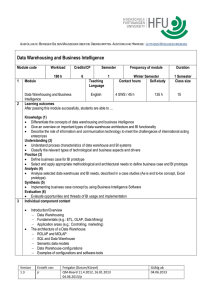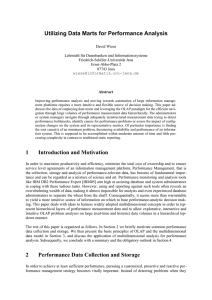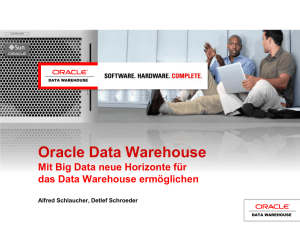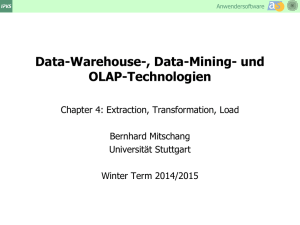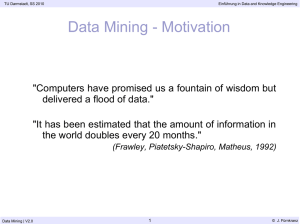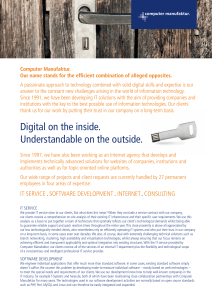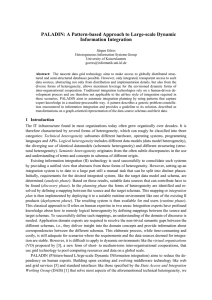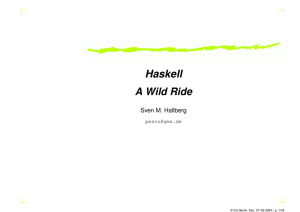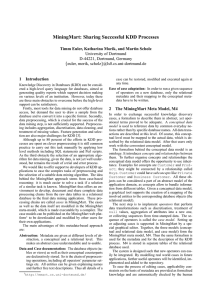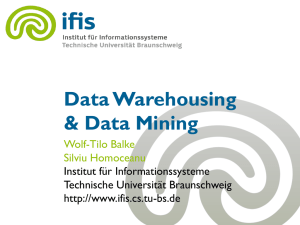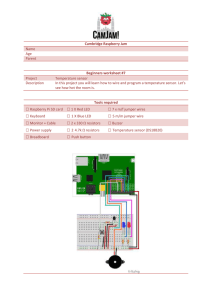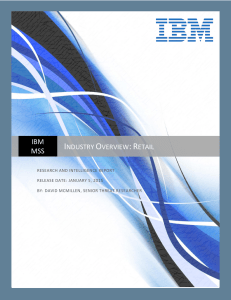Data-Warehouse-, Data-Mining- und OLAP
Werbung
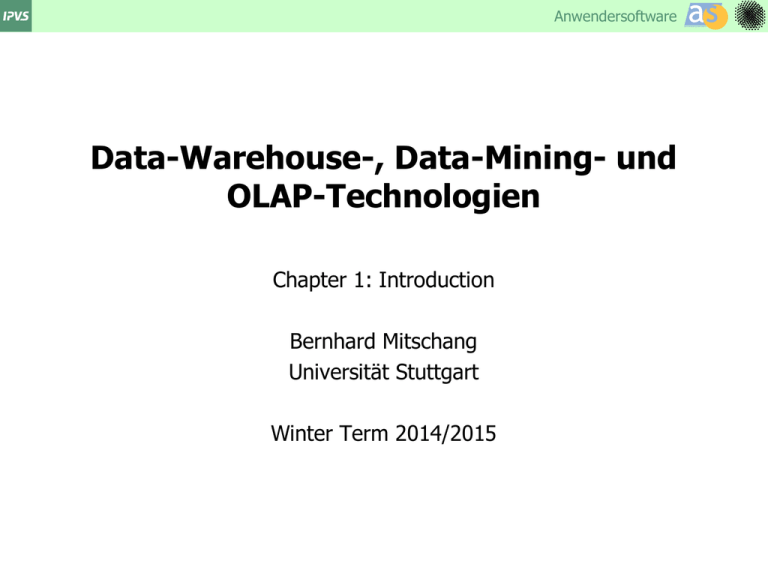
Anwendersoftware
as
Anwendungssoftware
Data-Warehouse-, Data-Mining- und
OLAP-Technologien
Chapter 1: Introduction
Bernhard Mitschang
Universität Stuttgart
Winter Term 2014/2015
Introduction
Anwendersoftware
as
Anwendungssoftware
Overview
• Motivation
Retail Scenario
Heterogeneous Data Sources
The Basic Idea
•
•
•
•
•
Operational vs. Analytical Systems
Fields of Application
Information Services
Other Approaches
Overview Chapters 2-7
2
Introduction
Anwendersoftware
as
Anwendungssoftware
Retail Scenario
• Retail company runs many department stores in Europe (Berlin, London,
Paris, Rome, …).
• The goods come from global suppliers.
• Business people (marketing, inventory management, …) need to know:
What are the gross sales for an article in each country?
What are the gross sales for an article per month?
What are the gross sales for an article per quarter?
What is the sales-per-square-meter of an article?
Did our last sales promotion push the gross sales
of an article?
Which articles are typically sold together?
Which customer groups are most likely interested in a special sales
promotion?
…
3
Introduction
Anwendersoftware
as
Anwendungssoftware
Heterogeneous Data Sources
• The retail company runs several database systems that capture all the
operational data:
one point-of-sale (POS) database per department store
one supplier database per country
one central article database
…
suppliers
Germany
information
articles
POS
Berlin I
suppliers
Italy
POS
Berlin II
POS
Rome
POS
London
…
suppliers
France
4
Introduction
Anwendersoftware
as
Anwendungssoftware
Heterogeneous Data Sources
• Broad range of data sources:
Database systems (relational, object-relational, hierarchical, XML, …)
Enterprise Resource Planning Systems
External information sources (other companies, surveys, …)
Files of standard applications (Excel, …)
Other documents (Word, WWW, …)
• Data Sources may differ in:
schema
coding schemes
time frame
treatment of history
aggregation level
database management system (data model, vendor, version, …)
5
Introduction
Anwendersoftware
as
Anwendungssoftware
Data Warehouse: The Basic Idea
POS
London
SELECT
FROM supplier
WHERE supp_date > 040126
AND supp_name LIKE 'A%'
articles
suppliers
Germany
Query
Report
POS
Berlin I
suppliers
Italy
POS
Berlin II
Enterprise
Data
Warehouse
suppliers
France
POS
Rome
•
•
separation of operational and analytical data
several analytical applications supported
OLAP
Data
Mining
6
Introduction
Anwendersoftware
as
Anwendungssoftware
Information Pyramid
effectiveness
OLAP,
Data Mining
strategic
Data Warehouse
performance
All this data
must be worth
something
Transaction Processing (OLTP)
(heterogeneous information systems,
isolated information islands
constantly increasing data sets)
Too much data,
not enough
information
planning
operational
We are drowning
in information,
but starving for
knowledge
7
Introduction
Anwendersoftware
as
Anwendungssoftware
users
data
queries/transactions
Operational vs. Analytical Systems
operational
analytical
focus
read, write, update, delete
read, periodical update
transaction
short read/write transaction
long read transaction
queries
simple
complex
records per
transaction
tens
millions
data model
flat relation
multidimensional
data sources
mainly one
many
properties
current, up-to-date, detailed,
isolated
historical, summarized, consolidated
volume
MB - GB
GB -TB
data access
single rows
ranges
user type
clerk, IT professional
knowledge worker, manager
number of
> 103
> 100
response time
ms - s
s - min
metric
transaction throughput
query throughput, response time
8
Introduction
Anwendersoftware
as
Anwendungssoftware
Operational vs. Analytical Systems
T1
T2
T3
<name>Butler</nameY
<address>Chester Road>/address>
<phone>+03 6543 2323</phone>
<email>xyz@netmail</email>
<…>…<…>
Files
performance and
safety considerations
T4
logical interoperability
problems
t1
t1
t2
t3
temporal and
granularity mismatch
9
Introduction
Anwendersoftware
as
Anwendungssoftware
Fields of Application
• Business Management
Marketing Management
Enterprise Information Portals
One-to-one-Marketing, Electronic Customer Care,
Customer Relationship Management (CRM)
Electronic Procurement, Supply Chain Management
• Scientific Applications
empirical studies, e.g. in earth observation, environmental studies
Statistical and Scientific Databases (SSDB)
• Engineering Applications
analyzing the reliability of products
analyzing substances and material
10
Introduction
Anwendersoftware
as
Anwendungssoftware
Introduction to Services
Definitions of ‘Service’
• A repeatable business task – e.g., check customer credit; open
new account
• Discretely defined set of contiguous and autonomous business or
technical functionality
• A function provided at a network address; available via various
transports, formats, and QoS; “always on”
• A mechanism to enable access to capabilities, which is provided
using a prescribed interface and is exercised consistent with
constraints and policies as specified by the service
description
Sources: IBM; Wikipedia; Frank Leymann; OASIS SOA Reference Model
Introduction
Anwendersoftware
as
Anwendungssoftware
Introduction to SOA
Definitions of ‘Service-oriented Architecture’
• An IT architectural style that supports integrating your business as
linked services
• A method for systems development and integration where
functionality is grouped around business processes and packaged as
interoperable services
• An architectural style to realize service-oriented computing
• A paradigm for organizing and utilizing distributed capabilities that
may be under the control of different ownership domains
Service
Requestor
Bind
Execute
Service
Provider
Publish
Find
Service
Registry
Introduction
Anwendersoftware
as
Anwendungssoftware
Overview of Information Services
•
Service-oriented Architecture:
Integrierter Ansatz zur Erneuerung der Geschäftsprozesse
(Software AG)
•
"You will waste your investment in SOA unless you have enterprise information
that SOA can exploit." (Gartner, 2005)
Information is a Vital Component of SOA Strategy
•
Information Service:
Equals: Data Storage + Retrieval (and crunching)
Definition: Every capability needed to understand, cleanse, integrate and
deliver information across heterogeneous systems
Goal: services that provide accurate, consistent, integrated information to
business processes and people
Starting point: existing legacy, inconsistent & diverse data
Approach: Information as a Service
Exposing application logic as services
Data is only accessible through the corresponding application logic
If needed: Mediation (brokering) and orchestration (workflow) of application logic
Introduction
Anwendersoftware
as
Anwendungssoftware
Classification of Information Services
• Classification Criteria:
Level of abstraction:
-
Plain source data (SQL, ...) or meta data
Integrated data (data/information integration, ETL, ..., MDM)
Interpreted data (BI, ..., text analytics, content extraction)
Application data (CRM, ...)
Range
- Intranet
- Internet
Source
- Single/multiple
- Homogeneous/heterogeneous
Provisioning of the service
- Proprietary service
- Web/SOA service
...
Introduction
Anwendersoftware
as
Anwendungssoftware
Cloud Computing: One Big Picture
Gartner: “Cloud Computing is a style of computing where massive
scalable IT-enabled capabilities are delivered as a service to
external customers using Internet technologies.”
… others ..: Cloud Computing isn’t new. We have hosted apps for
years. But now also custom-developed applications can be
hosted in the cloud.
A Service
Business Properties
No startup cost
Pay per use (pay as you go): costs
grow linearly
Technical Properties
Simple and easy to use
programming model
Scalability and reliability as well as
administration (for free) Cloud
Minimum TCO Autonomic/Cloud,
Multi-tenancy
Introduction
Anwendersoftware
as
Anwendungssoftware
What is Missing?
1. Good and experienced Service Engineers
2. Good and experienced Cloud Engineers
3. Best Practices experiences
To 1.: International Master in Service Engineering (IMSE)
To 2.: International Master in Service Engineering (IMSE)
To 3.: International Master in Service Engineering (IMSE)
Introduction
Anwendersoftware
as
Anwendungssoftware
Other Approaches
1960s
1970s
Management Information Systems
(MIS)
Executive Information Systems (EIS)
Executive Support Systems
•
Goals
Focused on providing managers with
structured, periodic reports.
Integrated man/machine system for
providing information to support
operations, management, and
decision-making functions in an
organization.
Interactive information systems that
used data and models to help
managers analyze semi-structured
problems.
1980s
Decision Support Systems (DSS)
Management Decision Systems
Strategic Planning Systems
•
Why they failed:
lacking fast communication networks
lacking large, cheap, and fast data
storage
lacking cheap, high-performance
CPUs
lacking flexibility
lacking productivity
lacking trustworthiness
17
Introduction
Anwendersoftware
as
Anwendungssoftware
Defining 'Data Warehouse'
• A data warehouse is a subject oriented, integrated, non-volatile, and time
variant collection of data in support of management's decisions.
(Source: [Inm05])
• A data warehouse is a copy of transaction data specifically structured for
query and analysis.
(Source: [Kim96])
• Ein Data Warehouse ist ein physischer Datenbestand, der eine integrierte
Sicht auf die zugrunde liegenden Datenquellen ermöglicht.
(Source: [Zeh03])
18
Introduction
Anwendersoftware
as
Anwendungssoftware
Other Important Terms
• Data Warehousing:
Process of integrating data from several source systems, storing it in the data
warehouse database, and using this integrated data source.
• Business Intelligence:
General term that covers technology and tools to turn the volume of data a
organization collects and stores into meaningful information in order to
achieve better and timelier business decisions.
• Decision Support:
More general term referring to all kinds of analyses of existing data in order
to make better decisions - like data mining, online analytic processing (OLAP),
simulation, scenario analyses, ...
19
Introduction
Anwendersoftware
as
Anwendungssoftware
Issues in Data Warehousing
Architecture
Data Transformation
Metadata
Data Warehouse Refreshment
Phases
20
Introduction
Anwendersoftware
as
Anwendungssoftware
Goals of the Lecture
• Know what a data warehouse is and how it differs from other information
systems
• Know the main components of a data warehouse
• Know the main processes in a data warehouse system
• Know how to design the schema of a data warehouse
• Know how olap and data mining is used to gain information from data
warehouse data
• Know database technology that is adjusted to the needs of a data
warehouse system
21
Introduction
Anwendersoftware
as
Anwendungssoftware
Overview
•
Motivation
Retail Scenario
Heterogeneous Data Sources
The Basic Idea
•
•
•
•
Operational vs. Analytical Systems
Fields of Application
Other Approaches
Overview Chapters 2-7
Data Warehouse Architecture
Data Warehouse Design
Extraction, Transformation, Load
OLAP
Data Mining
Database Support
22
Introduction
Anwendersoftware
as
Anwendungssoftware
Architecture
data flow
control flow
End User
Data Access
Data
Warehouse
Data Warehouse Manager
Metadata Manager
Metadata
Repository
Load
Data Staging
Area
Transformation
Extraction
Monitor
Data Staging Area
Data Warehouse System
Data Sources
(Source: [BG04])
23
Introduction
Anwendersoftware
as
Anwendungssoftware
Information Integration
End User
Data Access
End User
Data Access
Data Warehouse
Mediator
Integrated
Schema
Global
Schema
Schema
Mappings
ETL
ETL
Wrapper
Wrapper
Data Sources
Data Sources
Data Sources
Data Sources
materialized II
Query Execution
virtual II
(Source: [LN07])
24
Introduction
Anwendersoftware
as
Anwendungssoftware
Metadata in Data Warehousing
• What data is available in the warehouse and where is the data located?
• Data dictionary: Definitions of the databases and relationship between
data elements
• Data flow: Direction and frequency of data feed
• Data transformation: Transformations required when data is moved
• Version control: Changes to metadata are stored
• Data usage statistics: A profile of data in the warehouse
• Alias information: Alias names for a field
• Security: Who is allowed to access the data
25
Introduction
Anwendersoftware
as
Anwendungssoftware
Chapter 2: Data Warehouse Architecture
• Data Warehouse Architecture
Data Sources and Data Quality
Data Mart
Operational Data Store
• Information Integration
materialized vs. virtual
Federated Information Systems
• Metadata
Metadata Repository
Metadata in Data Warehousing
CWM Metamodel
26
Introduction
Anwendersoftware
as
Anwendungssoftware
Data Warehouse Design Process
Requirement analysis
and specification
Operational
database schema
Conceptual
design
Semiformal
business concept
Logical
design
Formal conceptual
schema
Physical
design
Physical
database schema
Formal logical
schema
time
•
•
•
•
•
interview
noun analysis
brainstorming
document analysis
...
• starER
• dimensional
fact model
• ME/R
• mUML
•…
•
•
•
•
multidimensional
relational
object-relational
...
•
•
•
•
•
DB2
ORACLE
MS Server
Essbase
MS Analysis
Services
• ...
(Source: [HLV00])
27
Introduction
Anwendersoftware
as
Anwendungssoftware
Data Warehouse Design
Multidimensional Model
„Cube“ Metaphor
Fact Data
(sales)
Time
...
2002
day
month
year
Germany
shop#
region
country
Time
28
Introduction
Anwendersoftware
as
Anwendungssoftware
Data Warehouse Design
BI
Customer_Berlin I
Name
Address
Age
Articles_Berlin I
ANR
Name
Price
Order_Berlin I
Cust
ANR
Count
data warehouse
POS_Berlin I
ZIP
Town
Kunden_Berlin II
source systems
Name
Adresse
Artikel_Berlin II
Num
BII
Alter
Customers
CNR
Name Age
ZIP
Address
Stores
POS_Berlin II
Artikel
ZIP
Stadt
SNR
Stadtteil
Name
Address
Bestellung_Berlin II
Kunde
Anum
Anzahl
Farbe
Preis
Status
Orders
CNR
ANR
SNR
Count
Status
Customer_Rome
POS_Rome
ZIP
Name
Address
Age
Orders1_Rome
ONR
Town
Orders2_Rome
ONR
Article
schema?
Customer
R
Price
Articles
ANR
Name Price
Color
Size
Order_London
Cust
POS_London
ZIP
Town
District
Article
Num
Color
Customer_London
Name
Address
Age
Price
Status
L
29
Introduction
Anwendersoftware
as
Anwendungssoftware
Chapter 3: Data Warehouse Design
•
•
Data Warehouse Design Process
Conceptual Design
Multidimensional Model
Dimensional Fact Model, UML-based, starER...
•
Logical Design
Star Schema
Snowflake Schema
…
•
Dimensional Modeling
Extended Dimension Table Design
- Slowly Changing Dimensions, Large Dimensions with Frequent Changes, ...
Extended Fact Table Design
- Modeling Events and Coverage, Factless Fact Table, ...
•
Physical Design
30
Introduction
as
Anwendersoftware
Anwendungssoftware
Extraction, Transformation, Load
Articles_Berlin I
BI
ANR
Name
Price
101
Shirt
50€
102
Shirt
75€
113
Blouse
102€
114
Bluse
102€
204
Jeans
75€
Transformation
Load
data warehouse
same article?
113
Blouse
102€
Articles
ANR
704
source systems
Artikel_Berlin II
BII
Num
Artikel
502
Hemd
Jeans
missing article?
Color
Size
yellow L
Color
blue SizeXL
100103
Shirt
80€
white
M
Shirt
75€
black
M
65€
501
Halbarmhemd
513
Bluse
100105
Shirt
black
S
704
-
120113
Blouse 102€
pink
XS
120513
Blouse 150€
yellow
S
210204
Jeans
75€
blue
L
210704
Jeans
85€
blue
XL
340101
Socks
5€
black
6
Orders2_Rome
ONR
Article
Price
65€
missing price?
C456
Blouse
150€
C134
Shirt
C134
Jeans
75€
Orders
C134
Shirt
50€
CNROrders
ANR
C537
Blouse
102€
C456
Blouse
-
7017
CNR
100102SNR 1 Count
5
ANR
7098
100104
1
3
ok
7564
210704
1
12
ok
C_17
Article
Shirt
Num
5
Color
blue
Price
20
Status
open
Status
Color
Price (€)
7017
100105
2
1
open
Shirt
blue
75€
7017
210204
2
1
open
Shirt
black
75€
7017
100101
2
1
open
Jeans
blue
85€
7537
120113
2
1
open
open
7456
120513
2
1
open
…
…
…
…
…
Order_London
Cust
SNR Count
Article
same coding (€/£)?
L
Price
100104
same customer?
R
Name
ArticlesShirt
100101
50€
ANR
Name Price
100102
Shirt
75€
Status
C_98
Shirt
3
black
20
ok
C_564
Jeans
12
blue
25
ok
31
Introduction
Anwendersoftware
as
Anwendungssoftware
Chapter 4: Extraction, Transformation, Load
• Monitoring
• Extraction
Export, Import, Filter, Load
Direct Integration
• Load
Bulk Load
Replication
Materialized Views
• Transformation
Schema Integration
Data Integration
Data Cleansing
• Tools
32
Introduction
Anwendersoftware
as
Anwendungssoftware
OLAP
•
•
•
•
•
•
•
•
Online Analytic Processing
Technologies and tools that support (ad-hoc) analysis of multi-dimensionally
aggregated data
Individual analysis is supported, i.e., the user is not restricted to available
standard reports/analysis
Graphical user interface is available for analysis specification
Knowledge of a query language or programming language is not required
Result information is given graphically and made available for incorporation into
other applications
Users: Analysts, Manager, “knowledge worker”
Typical Analysis scenarios:
Multi-dimensional views, e.g. turnover per product group and month
Comparisons, e.g. turnover in Q4 compared to that of Q3
Ranking, e.g. top 10 product in a certain group ranked by turnover
33
Introduction
Anwendersoftware
as
Anwendungssoftware
OLAP
Slicing
Slicing +
Aggregation
Drilling
• Examples:
Slicing: Analysis of a certain product group
Aggregation: Sum of turnover for all products of a given product group
Drilling: Based on a previous analysis of a certain business area, further
analysis on a level of product group and even on the level of a single product
are performed
34
Introduction
Anwendersoftware
as
Anwendungssoftware
OLAP
predefined reports
define individual analysis
35
Introduction
Anwendersoftware
as
Anwendungssoftware
Chapter 5: Online Analytic Processing
• Introduction
• OLAP Operations
• OLAP Characteristics
OLAP Product Evaluation Rules
FASMI Test
• Multidimensional Database Systems
Multidimensional Arrays
Sparse Cubes
Multidimensional Query Language
• Architecture
MOLAP, ROLAP, HOLAP
36
Introduction
Anwendersoftware
as
Anwendungssoftware
Data Mining
• Data mining is the process of discovering hidden, previously unknown
and usable information from a large amount of data. The data is analyzed
without any expectation on the result. Data mining delivers knowledge
that can be used for a better understanding of the data.
[ISO/IEC JTC1/SC32 WG4 SQL/MM Part 6 WD, 2000]
• Data Mining Techniques:
Association Rule Discovery
Classification
{beer, nappies} {potato chips}
support = 0.04
confidence = 0.81
Clustering
Regression
revenue
revenue
age
#children
age
37
Introduction
Anwendersoftware
as
Anwendungssoftware
Data Mining
38
Introduction
Anwendersoftware
as
Anwendungssoftware
Chapter 6: Data Mining
• Introduction
Terms & Definitions
Disciplines & Applications
• Data Mining Techniques
Classification
Regression
Association Rule Discovery
Clustering
• Data Mining Systems
Tool
Trends
39
Introduction
Anwendersoftware
as
Anwendungssoftware
OLAP Support in SQL:1999
WINDOWs allow to apply aggregate
functions to the current row and its
neighboring rows.
•
GROUP BY clause is extended by the
CUBE and ROLLUP keywords which
allows multidimensional summaries.
500
partno
date
sales
P050
2003-09-29
500
800
P050
2003-09-30
200
850
P050
2003-10-01
100
1550
P050
2003-10-02
550
950
P050
2003-10-03
400
P101
2003-09-30
600
P101
2003-10-01
300
800
400
550
400
Sum(sales)
1750
900
400
100
300
550
200
600
2003-10-03
2003-10-02
2003-09-29
2003-10-01
P101
2003-09-30
P050
500
partno
•
date
40
Introduction
Anwendersoftware
as
Anwendungssoftware
CUBE
Sales
...
2002
day
month
year
Germany
query using grouping sets
shop#
region
country
Time
•
•
Support Roll-up (dimension
reduction)
Compute:
Sales for all aggregation
groups of attributes country, month
and group.
SELECT country, month, group, SUM(sales)
FROM Sales
GROUP BY GROUPING SETS (
(country, month, group),
(country, month),
(country, group),
(month, group),
(country), (month), (group), () )
GROUP
GROUP
GROUP
GROUP
GROUP
GROUP
GROUP
BY
BY
BY
BY
BY
BY
BY
country, month, group
country, group
country, month
month, group
country
month
group
41
Introduction
Anwendersoftware
as
Anwendungssoftware
CUBE
equivalent query using CUBE
SELECT country, month, group, SUM(sales)
FROM Sales
GROUP BY CUBE
(country, month, group)
country
month
group
sales
F
-
100
1250
F
-
200
2250
F
-
300
2250
country
month
group
sales
F
01/04
100
500
F
-
400
500
F
01/04
200
1000
GB
-
100
2400
F
01/04
300
250
GB
-
200
3300
F
01/04
-
1750
GB
-
300
400
F
02/04
100
750
GB
-
400
100
1250
GB
-
500
100
-
600
100
-
200
250
F
02/04
200
F
02/04
300
2000
GB
F
02/04
400
500
I
F
02/04
-
4500
I
-
300
750
F
-
-
6250
I
-
400
200
GB
01/04
100
400
I
-
500
1500
GB
01/04
200
800
I
-
600
800
GB
01/04
300
300
-
01/04
100
900
1500
-
01/04
200
2050
GB
01/04
-
GB
02/04
100
2000
GB
02/04
200
2500
+
-
01/04
300
1300
-
01/04
400
200
-
01/04
500
1500
-
01/04
600
800
GB
02/04
300
100
GB
02/04
400
100
GB
02/04
500
100
-
02/04
100
2750
02/04
200
3750
2100
GB
02/04
600
100
-
GB
02/04
-
4900
-
02/04
300
GB
-
-
6400
-
02/04
400
600
I
01/04
200
250
-
02/04
500
100
I
01/04
300
750
-
02/04
600
100
I
01/04
400
200
-
01/04
-
6750
I
01/04
500
1500
-
02/04
-
9400
-
-
100
3650
I
01/04
600
800
I
01/04
-
3500
-
-
200
5800
I
-
-
3500
-
-
300
3400
-
-
-
16150
"-": NULL value
-
-
400
800
-
-
500
1600
-
-
600
900
42
Introduction
as
Anwendersoftware
Anwendungssoftware
Evaluating Star Queries
SELECT
FROM
WHERE
AND
…
AND
AND
…
GROUP BY
• Optimizer of the DBMS has to decide on join
order, index usage, predicate push-down, …
• Alternative query plans for star queries:
D1.a, D2.d, …, Dn.x, f(F.fact)
F, D1, D2, …, Dn
F.b = D1.b
F.e = D2.e
γa, d, …, x
D1.c = …
D2.f = …
γa, d, …, x
γa, d, …, x
σn
D1.a, D2.d, …, Dn.x
σn
…
σn-1
σn
Dn
…
Dn-1
Dn
σn-1
σ2
D1
TIDs
AND
σ2
TIDs
TIDs
TIDs
σ1
D1
F
D1
D2
σ1
D1
F
D1
D2
σ1
D1
F
D2
σ1
F
Dn-1
Dn
σ2
D1
σ2
D2
F
D2
σn
Dn
F
Dn
43
Introduction
Anwendersoftware
as
Anwendungssoftware
TPCH Benchmark Schema
PART (P_)
PARTSUPP (PS_)
LINEITEM (L_)
SF*200.000
SF*800.000
SF*6.000.000
PARTKEY
PARTKEY
ORDERYEY
NAME
SUPPKEY
PARTKEY
MFGR
AVAILQTY
SUPPKEY
BRAND
SUPPLYCOST
LINENUMBER
TYPE
COMMENT
QUANTITY
SIZE
CONTAINER
RETAILPRICE
COMMENT
ORDERS (O_)
CUSTOMER (C_)
SF*150.000
SF*1.500.000
ORDERKEY
CUSTKEY
CUSTKEY
NAME
ODERSTATUS
ADDRESS
TOTALPRICE
NATIONKEY
ODERDATE
SUPPKEY
PHONE
ORDERPRIORITY
NAME
ACCTBAL
CLERK
ADDRESS
MKTSEGMENT
SHIPPRIORITY
NATIONKEY
COMMENT
COMMENT
SUPPLIER (S_)
SF*10.000
EXTENDEDPRICE
DISCOUNT
TAX
RETURNFLAG
LINESTATUS
SHIPDATE
COMMITDATE
RECEIPTDATE
SHIPINSTRUCT
SHIPMODE
COMMENT
PHONE
ACCTBAL
COMMENT
NATION (N_)
REGION (R_)
25
5
NATIONKEY
REGIONKEY
NAME
NAME
REGIONKEY
COMMENT
COMMENT
Database Scaling:
SF
database size
1
1 GB
10
10 GB
30
30 GB
100
100 GB
300
300 GB
1000
1000 GB = 1 TB
3000
3000 GB
10000
10000 GB
30000
30000 GB
100000
100000 GB
44
Introduction
Anwendersoftware
as
Anwendungssoftware
Chapter 7: Database Support
• Support for OLAP and Data Mining in SQL
OLAP:
ROLLUP, CUBE, WINDOW, OLAP Functions
Data Mining (SQL/MM)
• Database Support for OLAP
Partitioning
Materialized Views
Indexes
Optimization of OLAP Queries (Star Joins)
• Performance Evaluation: TPC Benchmarks
45
Introduction
Anwendersoftware
as
Anwendungssoftware
Books
[BG04]
[Len03]
[KR+98]
[Inm05]
[HK00]
[JL+02]
[Kim96]
[LN07]
[Wes01]
A. Bauer, H. Günzel: Data Warehouse Systeme. 2. Aufl., dpunkt, 2004.
W. Lehner: Datenbanktechnologie für Data-Warehouse-Systeme.
dpunkt, 2003.
R. Kimball, L. Reeves, M. Ross, W. Thornthwaite: The Data Warehouse
Lifecycle Toolkit. Wiley, 1998.
W. H. Inmon: Building the Data Warehouse. 4th Edition, Wiley, 2005.
J. Han, M. Kamber: Data Mining – Concepts and Techniques. Morgan
Kaufmann, 2nd Edition, 2006.
M. Jarke, M. Lenzerini, Y. Vassiliou, P. Vassiliadis: Fundamentals of
Data Warehouses. Springer, 2002.
R. Kimball: The Data Warehouse Toolkit. Wiley, 1996
U. Leser, F. Naumann: Informationsintegration, dpunkt, 2007.
P. Westerman: Data Warehousing. Morgan Kaufmann. 2001.
46
Introduction
Anwendersoftware
as
Anwendungssoftware
Papers
[Ber98]
[CD97]
[HLV00]
[Zeh03]
P. Bernstein: Repositories and Object Oriented Databases, SIGMOD
Record 27(1):88-96, 1998.
S. Chaudhuri, U. Dayal: An Overview of Data Warehousing and OLAP
Technology, SIGMOD Record 26(1):65-74, 1997.
B. Hüsemann, J. Lechtenbörger, G. Vossen: Conceptual Data
Warehouse Design. Proc. of the Second International Workshop on
Design and Management of Data Warehouses, Stockholm, 2000.
T. Zeh: Data Warehousing als Organisationskonzept des
Datenmanagements. In: Informatik Forschung und Entwicklung, Band
18, Heft 1, August 2003.
47
